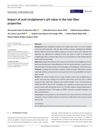 January 2013 in “Springer eBooks”
January 2013 in “Springer eBooks” Hair care products are important for appearance and self-esteem, and choosing the right ones can help maintain healthy hair.

Ajuga reptans L. extracts have strong antioxidant, anti-inflammatory, liver-protective, antimicrobial, and wound-healing properties.
 39 citations,
September 2016 in “Expert Opinion on Drug Delivery”
39 citations,
September 2016 in “Expert Opinion on Drug Delivery” New drug delivery methods can make natural compounds more effective and stable.
 22 citations,
January 2017 in “Advanced Healthcare Materials”
22 citations,
January 2017 in “Advanced Healthcare Materials” The hydrogels help harvest cells while preserving their mechanical memory, which could improve wound healing.
 5 citations,
January 2013 in “Journal der Deutschen Dermatologischen Gesellschaft”
5 citations,
January 2013 in “Journal der Deutschen Dermatologischen Gesellschaft” The document concludes that individualized treatment for malignant epithelial tumors is necessary and more research on metastatic squamous cell carcinoma treatments is needed.
 November 2024 in “Journal of Scientific Agriculture”
November 2024 in “Journal of Scientific Agriculture” Silk proteins are great for cosmetics because they protect and improve skin and hair while being eco-friendly.
 November 2024 in “Nanomaterials”
November 2024 in “Nanomaterials” The nanocrystalline suspension effectively delivers dutasteride over time with minimal inflammation.
 73 citations,
July 2016 in “Cosmetics”
73 citations,
July 2016 in “Cosmetics” Mushrooms have beneficial properties for skin and hair care products and have great potential for future cosmetic use.
 2 citations,
January 2023 in “BioMed Research International”
2 citations,
January 2023 in “BioMed Research International” The secretome from mesenchymal stromal cells shows promise for improving facial nerve injury treatment.
 43 citations,
January 2013 in “Indian Journal of Dermatology, Venereology and Leprology”
43 citations,
January 2013 in “Indian Journal of Dermatology, Venereology and Leprology” The article concludes that advancements in hair cosmetics require dermatologists to stay informed about products and their potential risks, including allergies and higher risks for hairdressers.
 12 citations,
March 2020 in “Journal of Bioactive and Compatible Polymers”
12 citations,
March 2020 in “Journal of Bioactive and Compatible Polymers” Nanoparticles show potential for controlled release of hair loss drugs, improving treatment effectiveness.
 December 2023 in “International Journal of Pharmaceutics”
December 2023 in “International Journal of Pharmaceutics” New nanoparticles deliver plant extracts to hair follicles to treat conditions like hair loss and acne.
 5 citations,
June 2022 in “Frontiers in veterinary science”
5 citations,
June 2022 in “Frontiers in veterinary science” Improving how drugs are absorbed through the skin could better treat mange in wombats.
 3 citations,
June 2019 in “Journal of cosmetic dermatology”
3 citations,
June 2019 in “Journal of cosmetic dermatology” Lower pH straighteners change hair more but weaken it.
 8 citations,
June 2019 in “Pharmaceutical research”
8 citations,
June 2019 in “Pharmaceutical research” Applying heat with certain chemicals can greatly improve how well isotretinoin gets into the skin through hair follicles.
 1 citations,
August 2023 in “Advanced Drug Delivery Reviews”
1 citations,
August 2023 in “Advanced Drug Delivery Reviews” Microneedles are promising for long-acting drug delivery and can improve patient compliance, but more data is needed to confirm their effectiveness.
 2 citations,
February 2023 in “BJUI”
2 citations,
February 2023 in “BJUI” Urologists should monitor mental health in patients taking finasteride due to potential links to suicidal thoughts, adjusting dosage or stopping use if necessary. More research is needed to confirm if finasteride causes these thoughts.
 August 2023 in “International Journal of Molecular Sciences”
August 2023 in “International Journal of Molecular Sciences” Liposomes show promise for delivering CRISPR for gene editing but face challenges like delivery efficiency and safety concerns.
 13 citations,
October 2012 in “InTech eBooks”
13 citations,
October 2012 in “InTech eBooks” Nanocarriers could improve how drugs are delivered through the skin but require more research to overcome challenges and ensure safety.
 October 2023 in “Bioactive Materials”
October 2023 in “Bioactive Materials” The new hair loss treatment combining nitric oxide and minoxidil in a special carrier is effective for hair regrowth.
24 citations,
September 2020 in “Pharmaceutics” Lidocaine-loaded microparticles effectively relieve pain and fight bacteria in wounds.
 19 citations,
December 2021 in “Endocrine Reviews”
19 citations,
December 2021 in “Endocrine Reviews” There are various effective hormone treatments for puberty induction in boys and girls with hypogonadism, and starting treatment early is important.
 December 2023 in “Biointerface Research in Applied Chemistry”
December 2023 in “Biointerface Research in Applied Chemistry” Stiripentol shows promise as a potential treatment for androgen-related diseases but needs more testing.
 50 citations,
February 2022 in “Nanomaterials”
50 citations,
February 2022 in “Nanomaterials” Nanomaterials show promise in improving wound healing but require more research on their potential toxicity.
21 citations,
April 2021 in “ACS omega” Curcumin can be effectively loaded into polystyrene nanoparticles, which are safe for human cells and more biocompatible with curcumin inside.
 11 citations,
December 2018 in “Assay and Drug Development Technologies”
11 citations,
December 2018 in “Assay and Drug Development Technologies” Natural herbal compounds might treat certain medical conditions by reducing DHT levels, but more research is needed to confirm their effectiveness and safety.
 March 2005 in “International Journal of Cosmetic Science”
March 2005 in “International Journal of Cosmetic Science” A new method helps understand hair shine and various products improve hair care.
 23 citations,
March 2019 in “Environmental Chemistry Letters”
23 citations,
March 2019 in “Environmental Chemistry Letters” Cyclodextrins improve how steroid drugs work and are used in marketed medications and environmental applications.
 2 citations,
April 2021 in “International Journal of Pharmaceutics”
2 citations,
April 2021 in “International Journal of Pharmaceutics” Serum formulations were better at delivering molecules to the hair bulb than nanoparticles.
 1 citations,
May 2022 in “IntechOpen eBooks”
1 citations,
May 2022 in “IntechOpen eBooks” Obesity leads to physical, metabolic, reproductive issues, higher healthcare costs, and mental health problems.




























